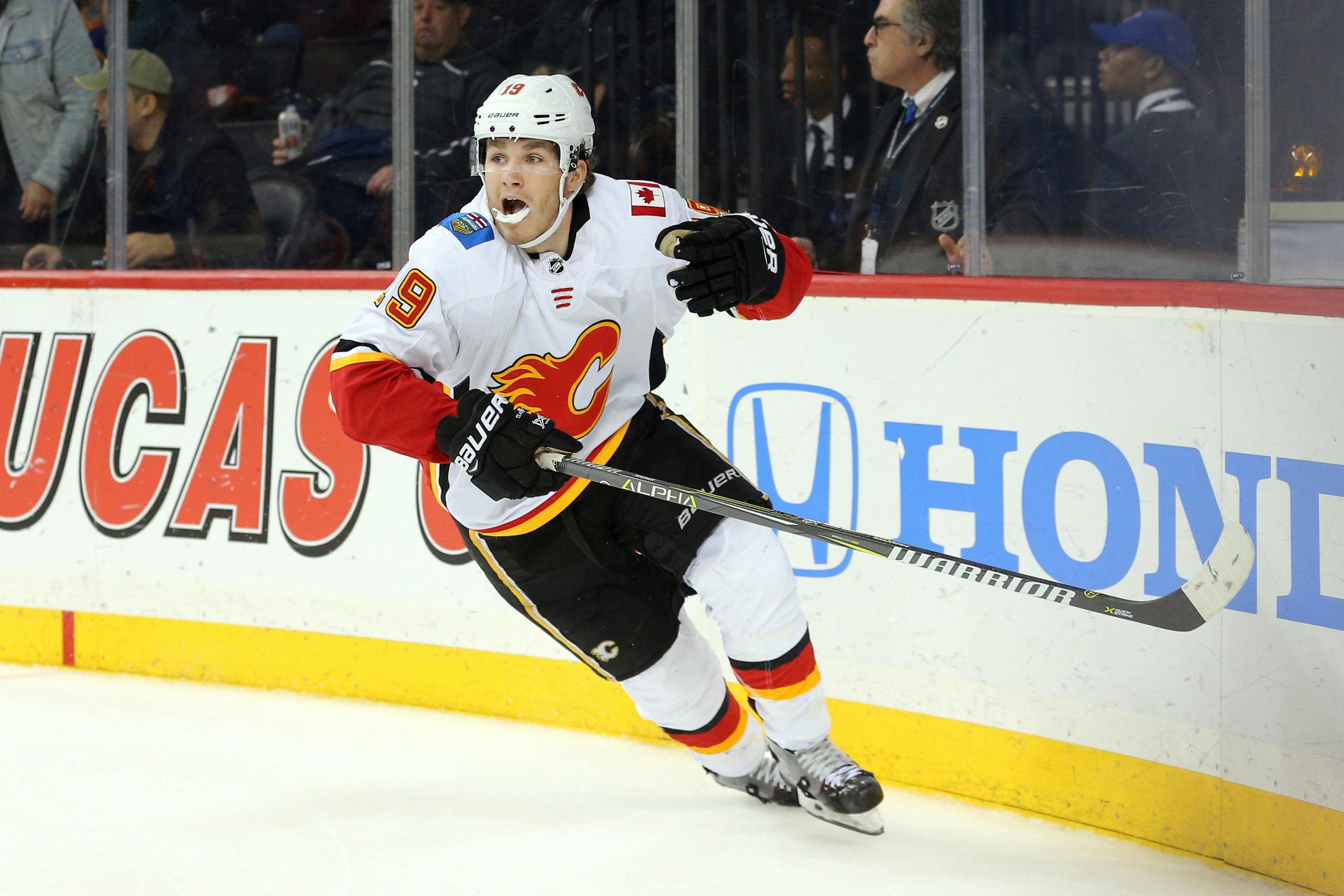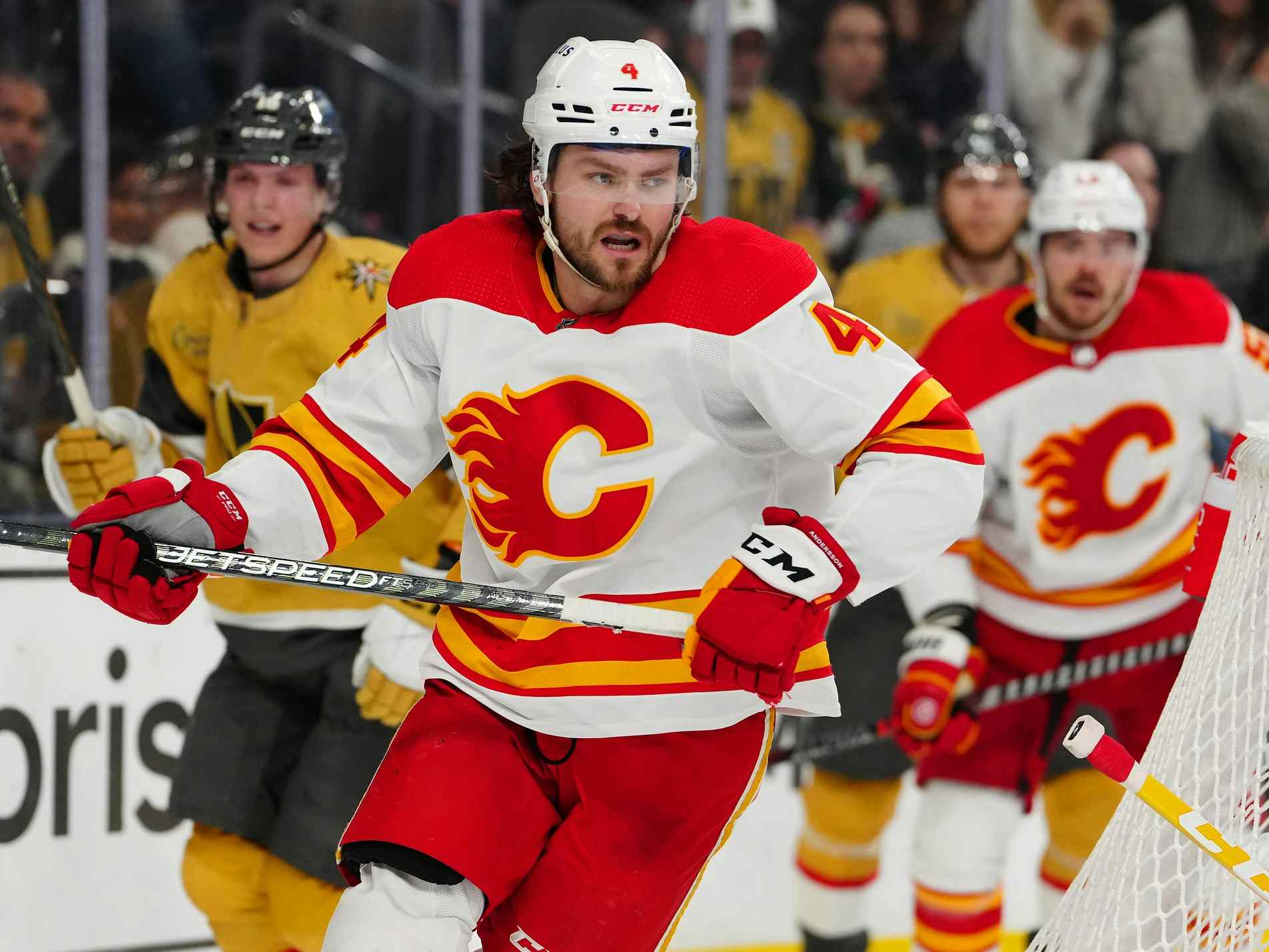Matthew Tkachuk’s contract conundrum hasn’t gotten any easier

Toronto’s Auston Matthews has set the bar and I can’t imagine many agents across the league are too upset about it. Matthews signed a deal worth $11.634 million (get it, he wears #34) over five years on Tuesday, which marks the first of this supergroup of high profile restricted free agents to get paid. Calgary’s Matthew Tkachuk makes up part of this 2019 banner class of RFAs and he didn’t get any cheaper after Monday’s news.
COMPARING NUMBERS
We’re talking about anywhere between seven and 10 players on this list, but I’ve narrowed it to the smaller number consisting of the players below. All seven are in their third NHL season and will finish the year with 200 or more NHL games under their belt, barring injury. I’ve excluded the likes of Kyle Connor and Brock Boeser because their workload is one season less, which makes it harder to compare straight across.
Totals below via Corsica; * denotes 5v5 outputs.
| Player | GP | G | PTS | P/G | G/60* | P/60* | CF% | OZS%* | Contract |
| Auston Matthews | 182 | 97 | 177 | 0.97 | 1.54 | 2.59 | 50.9 | 57.0 | 5 x $11.634 million |
| Matthew Tkachuk | 196 | 60 | 153 | 0.78 | 0.75 | 1.95 | 56.4 | 44.6 | ??? |
| Mikko Rantanen | 206 | 71 | 194 | 0.94 | 0.74 | 2.07 | 49.8 | 56.8 | ??? |
| Brayden Point | 201 | 80 | 170 | 0.85 | 1.00 | 2.26 | 51.9 | 53.1 | ??? |
| Patrik Laine | 207 | 105 | 167 | 0.81 | 1.20 | 2.01 | 48.1 | 56.6 | ??? |
| Sebastian Aho | 212 | 77 | 172 | 0.81 | 0.87 | 1.96 | 54.7 | 55.2 | ??? |
| Mitch Marner | 211 | 61 | 191 | 0.91 | 0.85 | 2.32 | 51.0 | 54.2 | ??? |
There’s no question Matthews is, and should be, the high mark in this conversation. Nobody on this list has produced like he has and, most importantly, no one other than Laine has manufactured goals at a comparable rate. This league pays those who score and Matthews does that at a high clip, both on the powerplay and five-on-five.
Where this leaves Tkachuk’s next contract is a little harder to pinpoint. Even with a career season in the works, Tkachuk’s counting numbers are the lowest of the bunch. That puts his camp at a disadvantage when using Matthews et al as comparisons, because goals and points still carry the most weight in negotiations.
What is a whole lot harder to handicap is how much Tkachuk’s significantly superior possession metrics are worth. He’s the only player in this discussion to have shown a consistent ability to drive play at even strength, which carries immense value on the ice but remains difficult to quantify in monetary terms. Tkachuk’s impressive 200-foot game carries clout, but how much remains to be seen.
THE SHORT-TERM DEAL

Brad Penner-USA TODAY Sports
There is a vocal group of Flames fans that believes Tkachuk’s cap hit on a new deal can’t exceed that of Johnny Gaudreau or Mark Giordano. Calgary’s two highest paid players just happen to be the team’s two best players, and some worry Tkachuk making more could send the wrong message. Unfortunately, the market dictates what a player gets paid more than any given team’s internal salary structure.
Gaudreau signed his deal before the NHL’s salary paradigm changed; you can thank Leon Draisaitl and Jack Eichel for that. If Gaudreau was coming out of his entry-level deal in this economic climate, $6.75 million over six years wouldn’t cut it. He’s not, though, and Tkachuk is, which makes it difficult to stay accountable to an internal cap on a long-term deal.
For the staunch believers in Calgary’s internal cap, though, there is a solution: a shorter term. The ONLY way the Flames get Tkachuk under $6.75 million per year is on a bridge deal, which would have to be three years. A three-year term would expire while Tkachuk is still RFA eligible, whereas a four-year deal would take him immediately to year one of free agency. Don’t do four years.
I’d also classify five years in the “short-term” category, but it’s unlikely Calgary could get Tkachuk under $6.75 million in that situation. If Matthews is the high bar at $11.634 million over five, is Tkachuk worth $5 million less in this NHL economy? It’s not a perfect apples-to-apples comparison, but it’s valid to suggest Tkachuk comes in closer to $8 million over five years.
THINKING LONGER TERM
If the Flames are interested in going six years or more with Tkachuk, they’ll have the ability to make it happen. While teams like Toronto and Tampa Bay have extremely tight cap situations, Calgary has a decent amount of flexibility to absorb a deal with max term.
What makes an eight-year term difficult for some teams is the incremental bump in AAV for each year of UFA eligibility purchased. Take Matthews’ deal for example; the Leafs are buying just one year of unrestricted free agency, which means you can probably add, say, $500k for each additional year. Thus, an eight-year deal for Matthews would probably come in closer to a $13 million AAV.
In Tkachuk’s case, let’s ballpark around $7.5 million on a five-year term. That might be low knowing where Matthews came in, but it gives us a decent jumping off point for this example. To get Tkachuk to the max term of eight at $500k per additional year (I feel like I’m in Math 20), we’re talking about around $9 million per season. The Flames could absorb that cap hit, but do they want to?
CONCLUSION
I fall in on the side of a long-term deal for Tkachuk, despite the fact it would see him become the team’s highest paid player by a wide margin. It’s the price of doing business in today’s league economy and it gives the Flames cost certainty for Tkachuk’s most productive years; an eight-year deal would expire a few months before he turns 30.
While a three-year bridge deal lowers the cap hit significantly, it also carries with it a ton of team risk. If Tkachuk puts up three more seasons of 80+ points, all of a sudden his leverage is that much stronger going into his second contract negotiation. If we’re talking $9 million on a max term now, think of what it could be in three years’ time.
Regardless of how you see it, though, one thing is for sure: Tkachuk’s camp doesn’t mind what his buddy Matthews signed for on Monday. Brad Treliving and the Flames may feel slightly different.
Recent articles from Pat Steinberg





